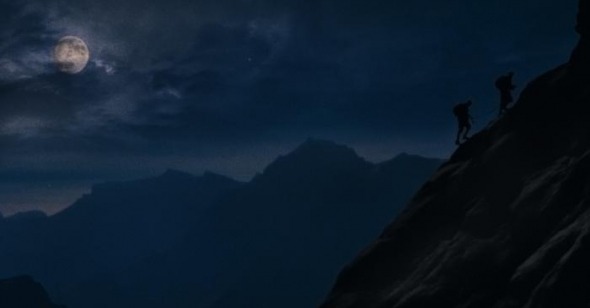Off Peak
by Jeff Reichert
North Face
Dir. Philipp Stölzl, Germany, Music Box Films
The lineage of cinematic mountain climbing extends back to the films of the 1900s. These early efforts evolved into the hugely popular German Bergfilme of the Twenties, the Alpine equivalent of the American western; in both genres the activities of its characters are circumscribed by features of the landscape. The image of the heroic Aryan mountain climber conquering nature through force of will didn’t go unnoticed by the Third Reich in the 1930s (notably, Leni Riefenstahl began her career starring in Bergfilmes), and the Germanic mythology captured in these works certainly found a ready outlet in the epic pageants of the Nazi era. Aside from Eastwood’s The Eiger Sanction, Cliffhanger is probably the most familiar mountain climbing film to many (though Bergfilme purists are quick to note the ways in which it strays from the mold), but it didn’t do a great deal to resuscitate the genre in the Nineties; the outsized success of the smaller-scaled Touching the Void represents a more accessible reboot for these perilous dramas. Now, German filmmaker Philipp Stölzl (he of the dolorous video for Rammstein’s “Du Hast” and Madonna’s “American Pie”) returns to the wellspring of the Bergfilme to tackle the true story of a pair of young German climbers in 1936, a task fraught both politically and technically.
As of the point when North Face is set, no team had successfully scaled the treacherous north face of Switzerland’s Eiger (the Ogre), making it a challenge of epic proportion for mountaineers across Europe. Climbers Toni Kurz (Benno Fürmann) and Andi Hinterstoisser (Florian Lukacs), two young German soldiers, are the heroes of North Face, but Stölzl’s scenario starts in Berlin with aspiring journalist Luise (Johanna Wokalek), whose newspaper, part of the Reich’s propaganda arm, is pushing for a successful ascent prior to the upcoming Olympics to boost national pride to a fever pitch. Luise, an awkward fictional construct, is conveniently a childhood friend of Toni and Andi’s, and is dispatched to their home to persuade the boys to join the chase to the top. She’s initially unsuccessful, but her pressure seeds the idea with Andi, the more daring of the pair, who eventually convinces the taciturn Toni to join him. The two quit the army (likely an apocryphal touch to render the jaunty duo apolitical), make some tools and head off by bicycle to the Alps.
The boys, like all the characters in North Face, are sketches; we learn just enough to be able to tell them apart before they’re thrust upon the Eiger. Even so, the film takes far too long to get them there. Stölzl wastes unnecessary time constructing narrative threads around his fictional characters to beef up a story that would have been better left unadorned—climbers and mountains are really all one needs. Instead North Face decides that Luise and Toni share lingering romantic feelings for each other, which results in several scenes where the rural, unpolished Toni expresses anger over Luise’s newfound city girl ways (this rural=good/urban=bad dichotomy is left unchallenged throughout, as it would have been in any good piece of propaganda work of the Thirties), even as their smoldering glances suggest a depth of feeling left unspoken. The Nazis are represented by Luise’s boss, initially a paternal figure interested in guiding her journalism career, whose gruff warmth towards her is gradually whittled away to reveal a crass desire to exploit the boys’ story to sell newspapers (and inject some weak historical revisionism into the mix). All this machinery is set up for a very functional reason: so that Stölzl will have recognizable spectators in the foothills when he needs to cut away from the action on the mountain. Where North Face goes from there isn’t terribly surprising. Toni and Andi climb; Luise waits at the bottom, watches, looks anxious; her editor presses her to ignore her worries for Toni and just get the scoop.
If the narrative built around the ascent is clunky to the extreme, the filmmaking technique on display in the climb itself is nimble and often breathtaking. Using a combination of stunt doubles, interior sets, and footage with his actors captured on safe cliffs, Stölzl recreates the Eiger ascent, hewing mainly to the actual recorded details of the attempt, including its sadly ironic, unscriptable belief-defying conclusion. Better yet is an early climbing tease in which Toni and Andi scale a hill nearby their camp in broad, warm sunlight. The Eiger sequences are monstrous and claustrophobic; as the boys inch closer towards the summit, it feels as though the elements are literally working against them. Their joyous early climb better expresses the vertiginous ecstasy of being so high, so secure in one’s own powers and so near to death at the same time. (In a more focused work, the sequence might also have overturned the questionable ideological purposes such imagery was so often wedded to.) All the drama Stölzl needed for North Face was already there—why he and his team felt the need to manufacture more is a mystery.
